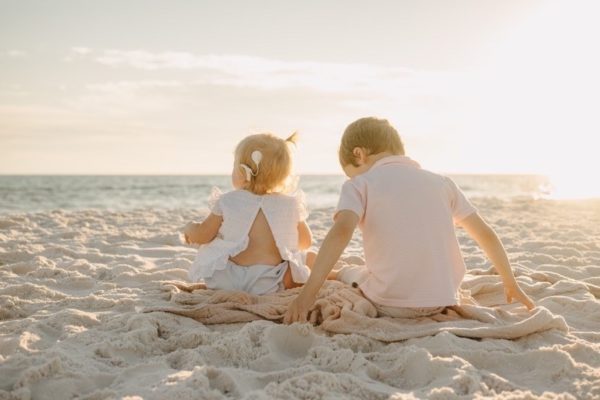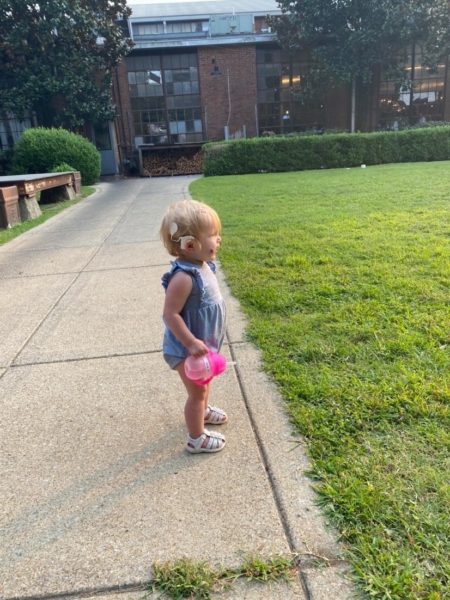When Henley failed her new-born hearing screening with a profound sensorineural hearing loss diagnosis, her family was shocked. After many months of research and decision making, they decided to get their daughter cochlear implants so she could communicate with the hearing world. She is now thriving at daycare, loves music and can even keep up with her older brother in sports! Read on:
“Henley, our 21-month-old daughter was born with bilateral profound sensorineural hearing loss. We have no history of hearing loss in our family, so when the nurse told us she failed her newborn hearing screening, we immediately accepted the explanation they gave, which was that it was probably just fluid in her ears. Six weeks later, when we were finally able to have an ABR (auditory brainstem response) screening completed by an audiologist, we were shocked to find out that our daughter is indeed deaf and would need cochlear implants to communicate via spoken language.
Choosing reliability and outstanding customer service
 The next 8.5 months were some of the hardest months I have had to endure as a mom. There were so many unknowns, so many unanswered questions, and worst of all, so much waiting. Henley was aided at 2 months old and wore her hearing aids up until implantation. One of the hardest decisions we made was which implant company to choose as we knew this would be a long-lasting decision and could positively or negatively impact Henley and her success with listening spoken language (LSL). After talking to several people, including audiologists, surgeons, and other moms who had been through this process before, we decided to go with Cochlear.
The next 8.5 months were some of the hardest months I have had to endure as a mom. There were so many unknowns, so many unanswered questions, and worst of all, so much waiting. Henley was aided at 2 months old and wore her hearing aids up until implantation. One of the hardest decisions we made was which implant company to choose as we knew this would be a long-lasting decision and could positively or negatively impact Henley and her success with listening spoken language (LSL). After talking to several people, including audiologists, surgeons, and other moms who had been through this process before, we decided to go with Cochlear.
To us, it came down to reliability, both in the product the company put on the market and in the longevity of the company. We feel confident that Cochlear will be around for years to come and will continue to provide cutting edge technology in this field. In addition to that, Cochlear’s customer service has been outstanding and something we have had to rely on several times already.
Making incredible strides after cochlear activation
Henley was implanted on her left side when she was 10 months old and on her right side when she was 12 months old. Because of the incredible skill of our surgeon, she was able to be activated soon after. Now, many months post activation of her left ear, we continue to be blown away by her success. At 2 years old, Henley is thriving at her mainstream daycare, loves to listen to music and jabbers away to her heart’s content. We have seen her make incredible strides in both her receptive and expressive language as well as her social skills as she learns to communicate with her peers.
Getting the most out of new technology
 We love the Nucleus® Smart App1 for iPhone®23 and use it frequently to find her processors when they happen to fall off. With a busy toddler, it happens even with the best retention solutions, and we are thankful for an easy way to locate them. We also love the Cochlear Aqua+4 water cases for her Nucleus 7 Sound Processors. Water safety is important to us, and her ability to hear while in and around water has given us comfort.
We love the Nucleus® Smart App1 for iPhone®23 and use it frequently to find her processors when they happen to fall off. With a busy toddler, it happens even with the best retention solutions, and we are thankful for an easy way to locate them. We also love the Cochlear Aqua+4 water cases for her Nucleus 7 Sound Processors. Water safety is important to us, and her ability to hear while in and around water has given us comfort.
Keeping up with the family
Our family loves to play sports whenever possible; Henley is able to keep up with the rest of us! Her hearing loss has in no way affected her ability to play with her older brother, no matter the activity or level of physicality. We believe that she will be able to do whatever she puts her mind to regardless of her hearing loss. I can’t wait to see how her life unfolds and all the things she will accomplish.
It goes without saying, her success would not be possible without our incredible team of audiologists, Speech language pathologists (SLP), Auditory verbal therapists (AVT), our surgeon and Cochlear.”
Has your child received a sensorineural hearing loss diagnosis like Henley? Learn more about early intervention and how it can be beneficial today.
5- The Cochlear Nucleus Smart App is available on App Store and Google Play. For compatibility information visit www.cochlear.com/compatibility.
- The Cochlear Nucleus 7 Sound processor is compatible with Apple and Android devices. For compatibility information visit www.cochlear.com/compatability.
- iPhone is a trademark of Apple Inc., registered in the U.S. and other countries. App Store is a service mark of Apple Inc., registered in the U.S. and other countries.
- The Nucleus 7 Sound Processor with Aqua+ is water resistant to level IP68 of the International Standard IEC60529. This water protection only applies when you use a Cochlear Standard Rechargeable Battery Module or Cochlear Compact Rechargeable Battery Module. The Kanso 2 Sound Processor is dust and water resistant to level of IP68 of the International Standard IEC60529. The Kanso 2 Sound Processor with Aqua+ is dust and water resistant to level of IP68 of the International Standard IEC60529. This water protection rating means that the sound processor with the Aqua+ can be continuously submerged under water to a depth of up to 3 meters (9 feet and 9 inches) for up to 2 hours. The Aqua+ accessory should be used when participating in prolonged water activities.
- The Nucleus 24 cochlear implant system is intended for use in children 9 to 24 months of age who have bilateral profound sensorineural deafness and demonstrate limited benefit from appropriate binaural hearing aids. Children two years of age or older may demonstrate severe to profound hearing loss bilaterally. In younger children, limited benefit is defined as lack of progress in the development of simple auditory skills in conjunction with appropriate amplification and participation in intensive aural habilitation over a three to six-month period. It is recommended that limited benefit be quantified on a measure such as the Meaningful Auditory Integration Scale or the Early Speech Perception test. In older children, limited benefit is defined as ≤ 30% correct on the open set Multisyllabic Lexical Neighborhood Test (MLNT) or Lexical Neighborhood Test (LNT), depending upon the child’s cognitive and linguistic skills. A three to six-month hearing aid trial is recommended for children without previous aided experience.